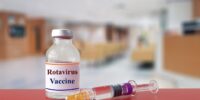Latest Research on Rotavirus: Advances in Treatment and Prevention

Are you curious about the latest breakthroughs in the treatment and prevention of rotavirus? Look no further!
This article will delve into the innovative approaches researchers have been taking to combat this common infection. From promising vaccines to cutting-edge therapies, you’ll discover the advancements that are revolutionizing the field.
Additionally, we’ll explore the latest epidemiological findings and advancements in diagnosing and testing for rotavirus.
Stay informed and stay ahead in the fight against rotavirus!
Key Takeaways
- Development of new antiviral drugs targeting rotavirus replication
- Vaccination as a major breakthrough in preventing rotavirus infections
- Importance of improved hygiene practices in reducing rotavirus transmission
- Promising vaccines, therapies, and diagnostics for improved treatment and prevention of rotavirus
Breakthroughs in Rotavirus Treatment
You’ll be interested to know that there have been significant breakthroughs in the treatment of rotavirus.
With the development of new antiviral drugs and emerging treatment strategies, the management of rotavirus infection has greatly improved. These new antiviral drugs specifically target the rotavirus, inhibiting its replication and limiting the severity of the infection. They have shown promising results in reducing the duration and severity of symptoms, as well as decreasing the risk of complications.
In addition to these drugs, emerging treatment strategies focus on providing supportive care to patients, such as maintaining hydration and electrolyte balance. These strategies aim to alleviate symptoms and prevent complications associated with rotavirus infection.
With these advancements, the future of rotavirus treatment looks promising, offering hope for improved outcomes and reduced morbidity.
Innovative Approaches to Preventing Rotavirus Infections
To effectively prevent rotavirus infections, consider innovative approaches that have emerged in recent studies. Here are three novel interventions and preventive strategies that have shown promise in reducing the transmission of rotavirus:
- Vaccination: The development of rotavirus vaccines has been a major breakthrough in preventing infections. These vaccines stimulate the immune system to produce antibodies against the virus, effectively reducing the risk of severe illness and hospitalization.
- Improved hygiene practices: Simple measures like regular handwashing with soap and water can significantly reduce the spread of rotavirus. Additionally, promoting good sanitation practices, such as proper disposal of feces, can help prevent contamination of water sources and food.
- Public health campaigns: Raising awareness about rotavirus and its prevention through educational campaigns can empower individuals and communities to take necessary precautions. These campaigns can emphasize the importance of vaccination, hygiene, and proper sanitation practices in preventing rotavirus infections.
Promising Vaccines for Rotavirus
Consider exploring the promising vaccines available for rotavirus, as they’ve shown great potential in preventing infections and reducing the severity of illness. These vaccine candidates have undergone rigorous studies to evaluate their effectiveness. The table below provides a summary of some of the most promising vaccines for rotavirus:
| Vaccine Name | Type | Efficacy (%) | Side Effects |
|---|---|---|---|
| Rotarix | Live attenuated | 85-98 | Mild |
| RotaTeq | Live attenuated | 85-98 | Mild |
| Rotavac | Live attenuated | 53-69 | Mild |
| Rotasiil | Live attenuated | 56-73 | Mild |
These vaccines have been extensively studied in vaccine effectiveness studies, demonstrating their ability to significantly reduce the incidence of rotavirus infections. While mild side effects may occur, the benefits of vaccination far outweigh the risks. It is essential to consult with healthcare professionals to understand the best vaccination options for you and your family. Together, we can protect ourselves and our communities from the devastating effects of rotavirus.
Cutting-edge Therapies for Rotavirus-Related Complications
If you’re experiencing complications related to rotavirus, there are cutting-edge therapies available that can help alleviate your symptoms and improve your overall health. Here are four emerging treatments that you should know about:
- Monoclonal Antibodies: These novel therapies work by targeting specific proteins on the surface of the rotavirus, preventing it from infecting healthy cells.
- Probiotics: Emerging research suggests that certain strains of beneficial bacteria can help restore the balance of gut flora disrupted by rotavirus infection, reducing symptoms and promoting faster recovery.
- Antiviral Medications: Researchers are developing antiviral drugs that directly inhibit the replication of rotavirus, reducing the severity and duration of symptoms.
- Immunomodulators: These emerging treatments help regulate the immune response to rotavirus, preventing excessive inflammation and tissue damage.
With these cutting-edge therapies, there is hope for improved outcomes and a quicker recovery from rotavirus-related complications. Consult your healthcare provider to explore these options and determine the best course of treatment for you.
Advancements in Rotavirus Diagnosis and Testing
There’s been significant progress in diagnosing and testing for rotavirus, with new methods that offer faster and more accurate results. Rapid diagnostics and point of care testing have revolutionized the way we identify and manage rotavirus infections. These advancements have greatly improved patient outcomes and allowed for more timely interventions.
To illustrate the impact of these new diagnostic methods, let’s take a look at the following table that compares the traditional diagnostic approach with the newer rapid diagnostics and point of care testing:
| Traditional Diagnostics | Rapid Diagnostics | Point of Care Testing |
|---|---|---|
| Time-consuming | Quick and efficient | Immediate results |
| Requires specialized laboratory equipment | Minimal equipment needed | No need for laboratory testing |
| Less accurate | Highly accurate | Comparable accuracy |
As you can see, the newer methods offer numerous advantages, including speed, simplicity, and accuracy. These advancements in rotavirus diagnosis and testing are crucial in effectively managing the disease and preventing its spread.
Latest Epidemiological Findings on Rotavirus
The epidemiological findings on rotavirus indicate a significant increase in cases among young children in the past year.
The global burden of rotavirus remains high, with millions of children affected annually.
The epidemiological trends show that the virus is highly contagious and easily spreads in areas with poor sanitation and hygiene practices.
Young children, especially those under the age of five, are most vulnerable to severe rotavirus infections.
The increase in cases highlights the need for improved prevention strategies, such as widespread vaccination and promoting good hygiene practices.
Vaccines have proven to be effective in reducing the incidence of rotavirus infections, but there is still a need for greater accessibility and coverage in high-risk populations.
Additionally, ongoing surveillance and research are essential to monitor the epidemiological trends and develop targeted interventions to reduce the global burden of rotavirus.
Frequently Asked Questions
What Are the Common Symptoms of a Rotavirus Infection?
Common symptoms of a rotavirus infection include diarrhea, vomiting, fever, and abdominal pain. The duration of the infection can range from a few days to a week, depending on the individual.
How Long Does a Rotavirus Infection Typically Last?
A rotavirus infection typically lasts for around 3-8 days. You can get infected through contact with contaminated surfaces or by ingesting the virus. Preventive measures include good hygiene practices and vaccination.
Is There a Cure for Rotavirus?
There isn’t a cure for rotavirus yet, but there are promising developments in vaccine development and emerging treatment options. Stay informed about the latest research and consult with your healthcare provider for the best course of action.
Can Adults Get Infected With Rotavirus?
Yes, adults can get infected with rotavirus. To prevent transmission, consider adult vaccination against rotavirus. Stay informed about the latest research on advances in treatment and prevention for rotavirus.
What Are the Risk Factors for Developing Severe Complications From Rotavirus?
If you want to know the risk factors for developing severe complications from rotavirus, it’s important to be aware of certain factors such as age, weakened immune system, and lack of preventive measures.









